Dreaming of creating a WordPress website but worried about how much it will cost you to build one?
We’ve all been there. Fact is, while WordPress is free to install, building and running a WordPress website typically costs anything from $2,546 to $28,635+, depending on your specific requirements and choices. On average, here’s a summary of the cost to build a WordPress based on various factors:
| COST COMPONENT | ESTIMATED COST RANGE | NOTES |
| HOSTING | ||
| – Shared Hosting | $36 – $120 per year | Basic option for small to medium-sized sites. |
| – Managed WordPress Hosting | $180 – $600 per year | Better performance and support. |
| – VPS/Dedicated Hosting | $240 – $1,200+ per year | For high-traffic sites. |
| DOMAIN NAME | $10 – $15 per year | Cost for purchasing and renewing a domain name. |
| DESIGN | ||
| – Free Themes | $0 | |
| – Premium Themes | $30 – $100+ one-time | Higher quality and more features. |
| – Custom Design | $500 – $5,000+ one-time | Hiring a designer for a unique look. |
| DEVELOPMENT | ||
| – Basic Development | $1,000 – $3,000 one-time | Basic coding and setup. |
| – Advanced Development | $3,000 – $10,000+ one-time | Complex functionalities like e-commerce or membership areas. |
| PLUGINS AND INTEGRATIONS | ||
| – Essential Plugins | $100 – $500 per year | Includes plugins like Yoast SEO and WooCommerce add-ons. |
| – Advanced Integrations | Varies | Depends on the number and complexity of integrations. |
| SSL CERTIFICATE | $0 – $100 per year | Often included with hosting plans, but premium SSLs can cost more. |
| MAINTENANCE | ||
| – Basic Maintenance | $50 – $300 per month | Regular updates, backups, and security. |
| – Comprehensive Maintenance | $600 – $3,600 per year | More extensive maintenance plans. |
| ADDITIONAL COSTS | ||
| – Content Creation | $500 – $2,000+ one-time | Professional copywriting or content creation services. |
| – Marketing and SEO | $300 – $1,500 per month | Ongoing costs for SEO tools and marketing efforts. |
| TOTAL ESTIMATED COST | $2,546 – $28,635+ | Depending on the choices made for each component. |
While the above might give you a snapshot of the cost for WordPress website, it is important that we break down these factors to understand the situation better. So, in this article, we’ll delve into the nitty-gritty of the cost of a WordPress website. We’ll also compare doing it yourself (DIY) versus hiring a professional developer, and then offer some practical tips on how you can minimize the cost without sacrificing quality.
Let’s jump in!
DISCLOSURE: WebIncomeJournal is supported by readers like yourself. We may earn an affiliate commission when you purchase through our links, which enables us to offer our content for free. Learn more here.
Why WordPress?
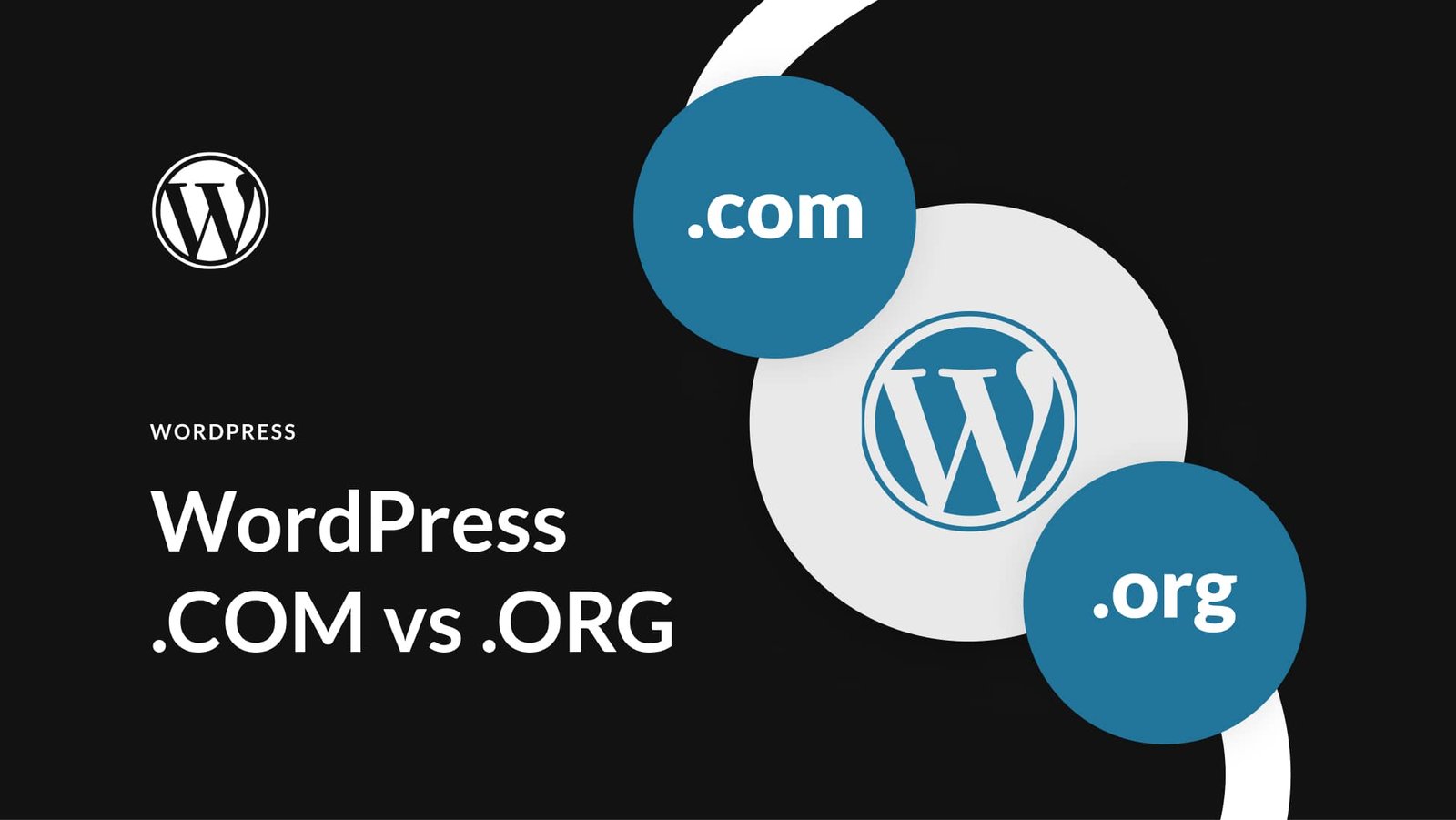
Let’s begin by first answering the question, why build a WordPress website?
WordPress is a versatile and popular platform for building websites. It powers over 43% of all websites on the internet, and for good reason. Its flexibility allows you to create anything from a simple blog to a full-fledged e-commerce site with WooCommerce.
Despite its versatility, WordPress is open source and free, making it a popular choice among website builders. However, some costs come with it. These include basic WordPress setup costs, premium themes and plugins, and maintenance plans.
It’s important therefore that you have a clear understanding of these costs before you embark on building your WordPress website. This will help you plan your budget effectively.
Recommended: WordPress for Beginners: The Ultimate Guide to Starting Your First Blog in 2024
Free WordPress Website Cost Calculator
Get a customized cost estimate for your WordPress site project. You don’t have to fly-blind. Know exactly what your WordPress website will cost you so you can plan your launch without any headaches and stress!
Key Factors Influencing Website Development Costs

So, what are the various factors that will influence the cost of your WordPress website? Let’s quickly break them down to give you a clear picture of where your money might go:
- Website Complexity: The complexity of your website is a major determinant of cost. A simple blog or portfolio site will cost significantly less than a complex e-commerce store or a membership site. Complexity influences all other cost factors, including design, development, and maintenance.
- Design: Hiring a designer to create a custom design for your website can range from $500 to $5,000 or more, depending on the designer’s experience and the project’s scope. However, if you go for premium themes, you can significantly reduce the cost as these typically cost between $30 and $100. Some popular options include themes from Elementor and WooCommerce. Free themes are budget-friendly but limited in customization.
- Development: Hiring a WordPress developer can range from $25 to $150 per hour. A complete development project might cost anywhere from $500 to $10,000, depending on the complexity. Adding advanced features like e-commerce (using WooCommerce), membership areas, or custom plugins can increase the cost. DIY approaches save money but require time and skills.
- Hosting: There are different hosting options to choose from. Shared hosting is the most affordable option, costing around $3 to $10 per month. Popular providers include Dreamhost, Bluehost, and Hostinger. Virtual Private Server (VPS) hosting offers more resources and better performance, costing $20 to $60 per month. A good VPS host is LiquidWeb. For large, high-traffic sites, dedicated hosting ranges from $80 to $300 per month. Providers like DreamHost and Bluehost are good options.
- Domain Names: A standard domain name typically costs between $10 and $20 per year. If you use providers like Namecheap, you can significantly reduce that.
- SSL Certificates: An SSL certificate is crucial for website security, encrypting data exchanged between the user and the site. Basic SSL certificates can be free (offered by hosting providers) or cost between $10 and $100 per year for more advanced options.
- Themes and Plugins: As mentioned, premium themes usually cost between $30 and $100. Essential plugins like Rank Math SEO for optimization or Wordfence for security might cost $0 to $100 annually. More specialized plugins could increase this cost.
- Integrations: Integrating third-party services like email marketing tools, CRM systems, or social media platforms can add to your costs. These integrations might require premium plugins or custom development work.
- Maintenance and Ongoing Updates: Maintaining a WordPress website involves regular updates to the core software, themes, and plugins. You might also need to perform backups and security checks. This can be done DIY, but hiring a professional typically costs between $50 and $200 per month.
| Category | Basic Website | Intermediate Website | Advanced Website |
| Domain | $10 – $20 | $10 – $20 | $10 – $20 |
| Hosting | $60 – $120 | $120 – $300 | $300 – $600 |
| Themes | $0 – $50 | $50 – $100 | $100 – $200 |
| Plugins | $0 – $50 | $50 – $150 | $150 – $500 |
| Development | $500 – $1,000 | $1,000 – $3,000 | $3,000 – $10,000 |
| Maintenance | $100 – $200 | $200 – $500 | $500 – $1,000 |
| Total Cost | $670 – $1,440 | $1,430 – $4,070 | $4,060 – $12,320 |
That being said, let’s now take an in-depth look at the various costs involved in building a WordPress site. We will consider these under two sub-headings (1) initial cost and (2) ongoing cost,
Related: Best WordPress Themes for eCommerce Sites in 2024
1. Cost for WordPress Website: Initial Costs
Design and Development
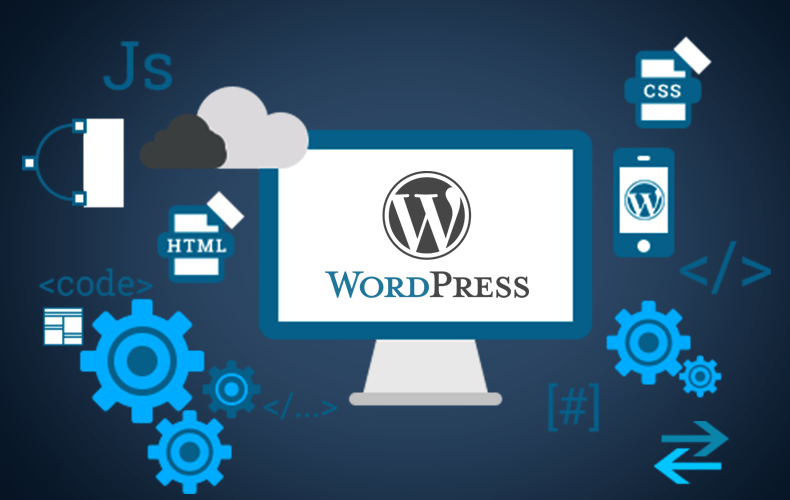
Design and development are key components of building a WordPress website, and costs can vary widely based on your choices and requirements. Let’s break down these costs to give you a clear understanding of what to expect.
Website Design Costs
- Custom Design: Custom design involves hiring a professional designer to create a unique look for your website. This option provides the most flexibility and personalization. Depending on the designer’s experience and the project’s complexity, a small business site with a custom design might cost around $500 and $2,000, while a large corporate site could easily exceed $5,000.
- Premium Themes: Premium themes are pre-designed templates that you can customize. They offer a balance between affordability and aesthetics. The cost range is usually from $30 to $100 per theme. Themes from Elementor and WooCommerce are highly regarded for their quality and flexibility and might cost you $50, providing a professional look without the high price of custom design.
Website Development Costs
- Coding and Integrations: Hiring a freelancer for development typically ranges from $25 to $150 per hour. The total project cost will depend on the scope and complexity. Agencies usually charge more, with costs ranging from $3,000 to $20,000+ for comprehensive development services. Typically, developing a basic informational website with a freelancer might cost $1,500, while an e-commerce site with advanced features could cost $10,000 or more with an agency.
- Advanced Functionality: Setting up an online store with WooCommerce involves costs for the plugin, payment gateway integrations, and custom functionalities. Expect to spend $1,000 to $5,000+ depending on your needs. If you’re developing a membership site with features like restricted content, user profiles, and payment processing, this can cost $2,000 to $10,000. Also, creating custom plugins for specific functionalities might cost $500 to $5,000 depending on complexity.
Understanding these design and development costs will help you budget effectively for your WordPress website. In the next section, we’ll explore hosting, domains, and maintenance costs to provide a complete picture of what it takes to keep your site running smoothly.
2. Cost for WordPress Website: On-Going Costs
Hosting, Domains, and Maintenance
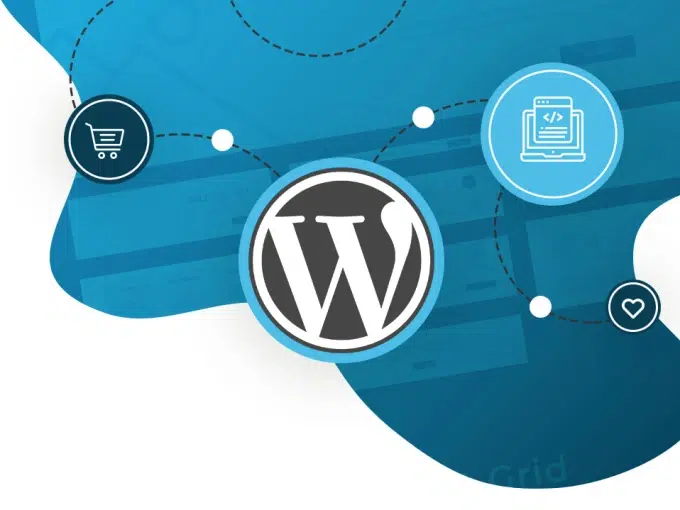
Once you’ve designed and developed your WordPress website, you’ll need to consider ongoing costs for hosting, domains, and maintenance. These factors ensure your website runs smoothly, stays secure, and remains up-to-date.
Hosting Costs
Web hosting is a continuous service, and renewal fees are an essential part of maintaining your website’s online presence. Here’s a breakdown of typical renewal costs based on hosting types:
- Shared Hosting: Typically costs between $3 to $10 per month, or $36 to $120 per year. It’s the most affordable option but may have limited performance.
- VPS Hosting: Prices range from $20 to $50 per month, or $240 to $600 per year. Offers better performance and control.
- Dedicated Hosting: Starts at around $100 per month, or $1,200 per year. Provides exclusive server use for high-traffic sites.
These costs can vary based on the hosting provider and the features included. Companies like Hostinger, Bluehost, and Dreamhost offer various plans tailored to different needs and budgets.
Related: The Best WordPress Hosting Services for Beginners in 2024
Domain Costs
Just like hosting, domain names require annual renewal to keep your website accessible. The cost usually ranges from $10 to $20 per year. Ensuring your domain name is renewed on time is crucial to avoid losing your website address. Popular registrars include Namecheap and Bluehost.
Theme and Plugins
If you use a premium WordPress theme, staying up-to-date with the latest versions is vital for security and functionality. Premium themes often come with an annual fee for updates and support, typically ranging from $30 to $100 per year. For example, the Elementor theme costs around $50 per year. This ensures compatibility with the latest WordPress versions and plugins, providing a seamless user experience.
Just like themes, premium plugins often require a yearly subscription for updates and support. This cost can range from $30 to $200 per year per plugin, depending on the complexity and features. Premium plugins like Rank Math SEO cost approximately $50 per year. Regular updates are crucial to maintaining security and performance, preventing vulnerabilities, and ensuring your site runs efficiently.
Related: Must-Have Premium Plugins for Your WordPress Site (2024 Top Picks!)
Website Maintenance
Maintaining a WordPress website involves more than just hosting and domain renewals. Regular maintenance tasks include:
- Website Uptime Monitoring: Ensuring your site is always accessible.
- Bug Fixes: Addressing any issues that arise with updates or changes.
- Content Updates: Adding new content and keeping existing content relevant.
- Security Monitoring: Implementing measures like SSL certificates, backups, and security plugins (e.g., Wordfence).
Here’s a pie chart breaking down the various cost components of building a WordPress website. It gives you a quick snapshot of where your money will go:
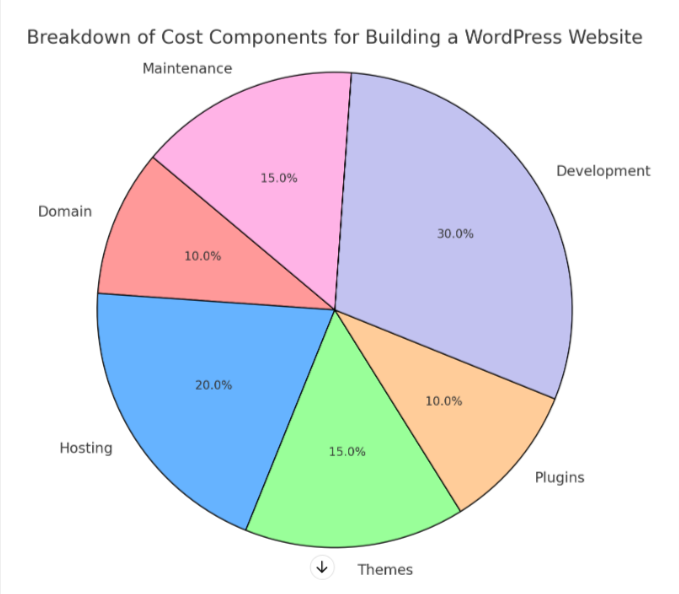
The cost of ongoing maintenance can vary widely. DIY maintenance might be low-cost but time-consuming while hiring a professional can cost anywhere from $50 to $200 per month. Managed WordPress hosting plans often include maintenance services, and bundling costs for convenience.
Recommended: 9 Key Elements of Professional Website Design That Drive Business Success
DIY vs. Hiring a Professional
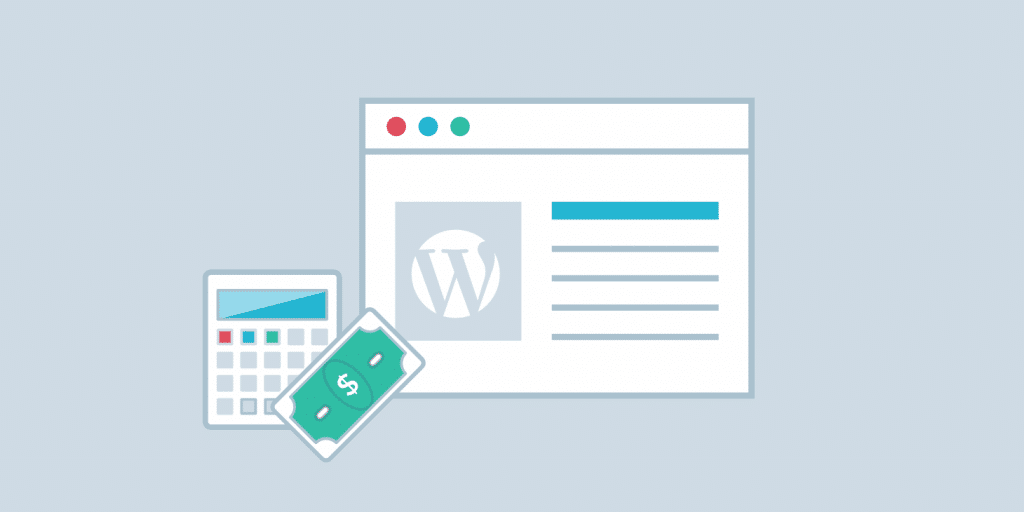
Now that you’ve gotten some idea of the cost for WordPress website, you might be wondering if you should go the DIY route or hire a professional. Of course, both options have their pros and cons, and your decision will impact your overall costs, the quality of your site, and the time it takes to launch.
Let’s take a quick look at the pros and cons of DIY vs. hiring a professional before providing some tips that will help you minimize the cost without compromising on quality.
DIY Approach
Building a WordPress website yourself can be cost-effective. You might spend between $50 and $300 on premium themes, plugins, and initial setup. However, you must be prepared to invest a considerable amount of time. Learning WordPress, troubleshooting issues, and customizing your site can take anywhere from a few days to several weeks.
Pros and Cons
Pros:
- Cost Savings: The primary advantage of the DIY approach is saving money. You avoid the hourly rates of professionals.
- Control: You have full control over every aspect of your website, from design to functionality.
- Learning Experience: Building your site yourself can be a valuable learning experience.
Cons:
- Time-Consuming: The DIY approach requires a significant time investment. If you’re not familiar with WordPress, the learning curve can be steep.
- Limited Expertise: Unless you have web development skills, your site might lack the polish and functionality that a professional could provide.
- Potential for Errors: Mistakes in setup or maintenance can lead to security vulnerabilities or performance issues.
Hiring a Professional
As we’ve mentioned, hiring a freelancer can cost between $500 and $5,000, depending on the project’s complexity and the freelancer’s experience. If you opt for a web design agency, this will typically cost between $3,000 and $20,000 or even more for comprehensive services.
Pros and Cons
Pros:
- Professional Quality: Professionals bring expertise and experience, resulting in a polished, high-quality website.
- Time Savings: You save time and effort, allowing you to focus on your business or other tasks.
- Advanced Functionality: Professionals can implement advanced features and customizations that might be challenging to achieve on their own.
Cons:
- Higher Costs: Hiring a professional is more expensive than the DIY approach. You’ll need to budget accordingly.
- Less Control: You might have less control over the design and development process, depending on the professional’s workflow.
- Finding the Right Professional: It can be challenging to find a reliable and skilled freelancer or agency.
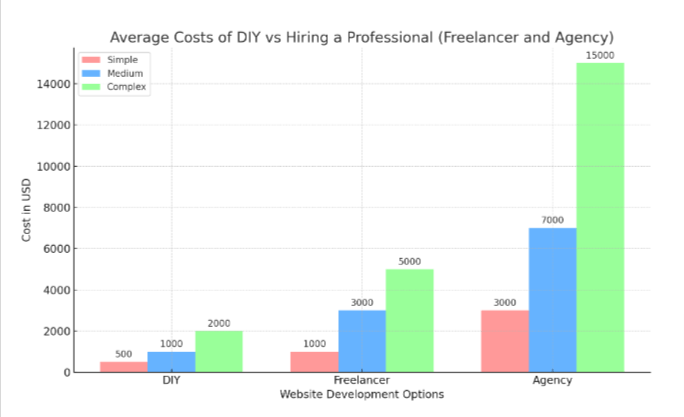
Trade-offs Between Cost and Quality/Functionality
Choosing between DIY and hiring a professional often comes down to a trade-off between cost and quality/functionality:
- Budget Constraints: If you have a limited budget, the DIY approach can help you get started without significant upfront costs. However, be prepared to invest time in learning and building.
- Quality and Functionality: For those who prioritize a high-quality, feature-rich website, hiring a professional is the better choice. The initial investment will pay off in terms of a more polished and functional site.
How to Decide Between DIY and Hiring a Professional
To help you decide the best approach for your needs and budget, consider the following questions:
- What is your budget? If you’re on a low budget then consider DIY but if you’re on a higher budget then hiring a professional might be worthwhile.
- How complex is your website? DIY is feasible for a simple blog or portfolio but for an e-commerce or membership site, hiring a professional is recommended.
- How much time can you invest? If you have limited time, hiring a professional might be the best way to go, but if you have ample time for your project, then DIY can be rewarding.
- Do you have technical skills? If yes, then DIY can be cost-effective. However, if you lack the necessary technical skills then hiring a professional ensures quality.
By weighing these factors, you can choose the best approach for building your WordPress website that fits your budget and meets your quality expectations.
Recommended: Website Launch Checklist: Do These 27 Things Before Launching Your Website
Minimizing Costs and Getting the Best Value
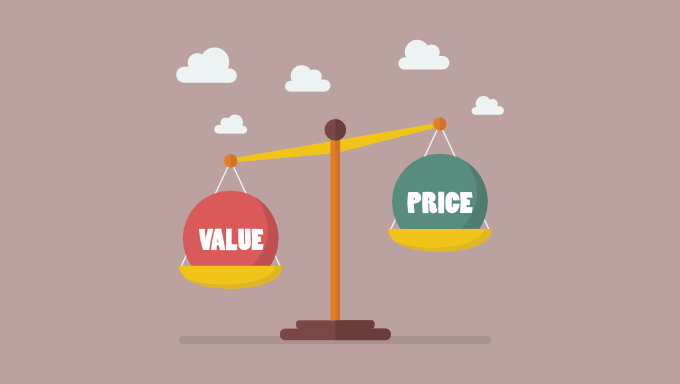
From the above, you can understand that there’s so much that goes into building a WordPress website. However, it doesn’t have to break the bank. With some strategic planning and smart choices, you can minimize costs while still achieving a high-quality, functional website.
Here are some practical tips and strategies to help you get the best value for your investment.
Practical Tips for Minimizing Costs
- Start with a Simple Website: Begin with a basic website that includes only essential features. This approach allows you to establish an online presence quickly and affordably, with the option to add more advanced features as your needs grow. A simple site can cost as little as $500 to $1,000, compared to more complex sites that can run into the thousands.
- Utilize Free Resources: WordPress offers a wealth of free themes and plugins that can help you create a professional-looking website without additional costs. For example, WordPress.org has a vast repository of free themes. Popular options like Astra and OceanWP provide flexibility and customization without a price tag. For plugins, you can enhance functionality with free plugins such as Rank Math SEO for search optimization, Elementor for page building, and Wordfence for security. Additionally, free content creation tools like Canva can help you design graphics and visuals, saving on design costs.
- Learn Basic Skills: Investing time in learning basic website maintenance skills can save you money in the long run. Tasks such as updating plugins, performing backups, and making minor content changes are manageable with a bit of practice. Numerous online tutorials and courses are available to help you gain these skills, reducing the need for professional services.
- Prioritize Needs vs. Wants: When building your website, it’s essential to differentiate between must-have features and nice-to-have extras. Focus on the core functionalities that directly support your business goals. These include essential pages like Home, About, Services, Contact, and Blog. Ensure your site is discoverable with essential SEO practices and implement basic security features to protect your site. Avoid spending on purely aesthetic elements that don’t add significant value to your site’s performance or user experience.
- Consider Long-Term Costs: While it’s tempting to focus solely on initial costs, it’s crucial to account for recurring expenses to avoid surprises down the road. Here’s a breakdown of long-term costs to consider:
| Cost Component | Estimated Annual Cost | Notes |
| Web Hosting | $36 – $1,200 | Depending on hosting type and provider. |
| Domain Renewal | $10 – $15 | Annual renewal fees for your custom domain. |
| Theme Updates | $30 – $100 | Premium theme updates and support fees. |
| Plugin Updates | $30 – $200 | Costs for maintaining premium plugins. |
| Website Maintenance | $600 – $2,400 | Regular maintenance tasks and professional support. |
By understanding these costs upfront, you can plan and allocate resources more effectively, ensuring your website remains functional and up-to-date.
Practical Tips for Budgeting
- Set Clear Goals: Define what you need from your website and allocate your budget accordingly.
- Use a Budget Template: Create a spreadsheet to track all costs and manage your budget efficiently.
- Shop Smart: Look for deals and discounts on hosting plans, themes, and plugins.
- Monitor Expenses: Regularly review your spending to stay within budget and adjust as needed.
Building a budget-friendly WordPress website is achievable with careful planning and smart resource utilization. By starting simple, leveraging free tools, learning essential skills, prioritizing needs, and considering long-term costs, you can create a professional website that meets your goals without overspending.
Recommended: Does Rank Math Really Work? (Here are 7 Key Findings It Does!)
Conclusion
So, how much does it cost to set up and run a WordPress website?
WordPress website costs are dependent on several factors. In this article, we’ve looked at these various factors, from initial setup costs to ongoing maintenance. We also offered some tips on how you can minimize your costs while ensuring the best value for your investment.
Whether you’re in your planning stages and you’re struggling with the question: How much does a WordPress website cost? Or, if you just need some guidance on budgeting for a WordPress project, we do hope this article can help you make informed decisions that align with your budget and business goals.
If you have any other questions about the cost for WordPress website or you need some further assistance, feel free to let us know in the comments below.
And, while you’re still here, we’ll appreciate it if you will help share this article online. Thanks for sharing!
Frequently Asked Questions (FAQ)
How much does a WordPress site cost?
The cost of a WordPress site can vary widely depending on various factors such as design complexity, development needs, and ongoing maintenance. Here’s a general breakdown:
- Domain Registration: $10 – $15 per year
- Web Hosting: $36 – $1,200 per year (depending on shared, VPS, or dedicated hosting)
- Themes: Free to $100+ (premium themes)
- Plugins: Free to $200+ per year (for premium plugins)
- Development: $500 – $5,000+ (depending on customization and complexity)
- Maintenance: $600 – $2,400 per year
How much is the cost of installing a WordPress website?
Installing WordPress itself is free if you do it yourself. However, if you hire a professional to install and set up your WordPress site, the cost can range from $50 to $500 depending on the complexity and additional configurations required.
Is a WordPress website really free?
WordPress itself is free to use as it is open-source software. However, you will incur costs for domain name (typically $10 – $15 per year), Web Hosting (starting at around $3 – $100+ per month) and premium Themes and Plugins (optional but can add to your overall cost).
Does WordPress need coding?
No, you do not need to know coding to use WordPress effectively. Many themes and plugins provide drag-and-drop functionality, allowing you to build and customize your site without any coding knowledge. However, knowing basic HTML, CSS, and PHP can be helpful for advanced customizations.
Is WordPress better than Wix?
WordPress and Wix both have their strengths. WordPress offers greater flexibility, a vast range of plugins and themes, and is ideal for more complex sites. It has a steeper learning curve but is highly customizable. Wix is Easier to use for beginners with a user-friendly drag-and-drop interface. It’s suitable for simple websites but offers less flexibility and scalability compared to WordPress.
Can I use WordPress without hosting?
No, you need web hosting to use WordPress.org, the self-hosted version of WordPress. However, WordPress.com offers hosted solutions where you don’t need to worry about hosting, but with some limitations compared to the self-hosted version.
Is WordPress hard to learn?
WordPress is relatively easy to learn, especially with the vast amount of tutorials and resources available online. For beginners, there may be a learning curve, but the platform is designed to be user-friendly. With time and practice, you can become proficient in managing and customizing a WordPress site.


